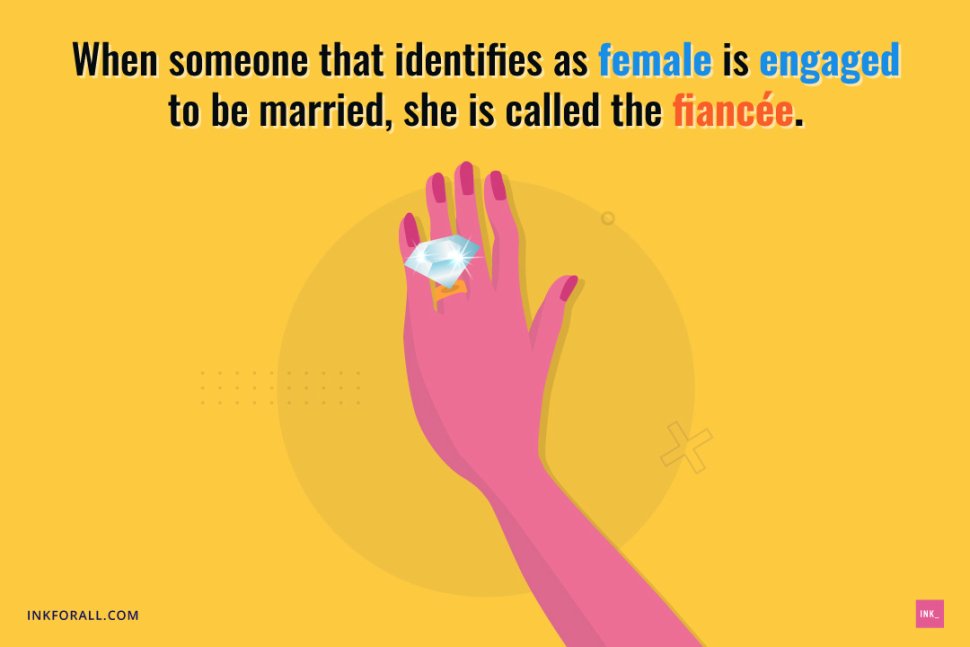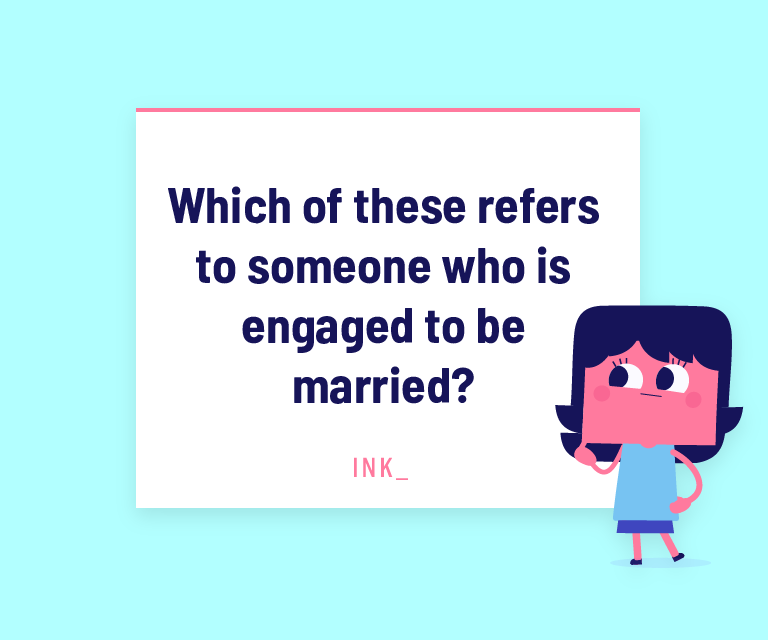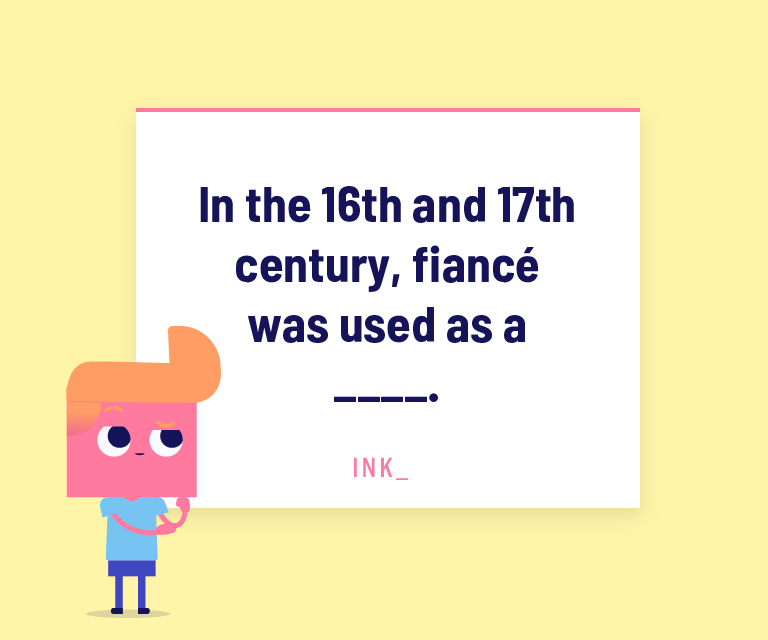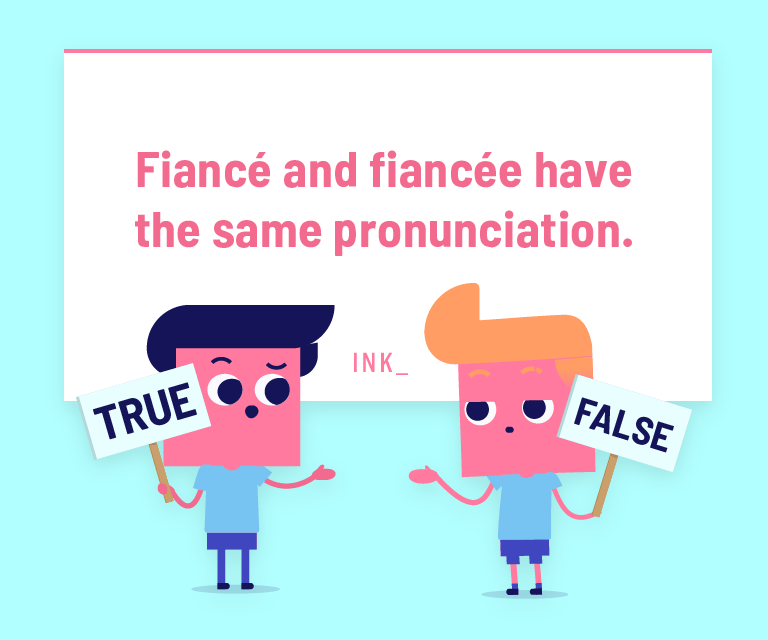Main Fiancée or Fiancé Takeaways:


Is it Fiancée or Fiancé?
Use fiancé (with one ‘e‘ at the end) for a male who is engaged to be married, but you should use fiancée (two ‘e‘s at the end) for a woman who is engaged to be married. Therefore, the difference between the spellings fiancé and fiancée is gender. This is because English borrowed these two words from French, which commonly uses separate word endings to differentiate between equivalent masculine and feminine words.
Two Easy Ways to Remember the Difference
💍 Trick #1: “E” is for Engagement (Extra Ring, Extra “E”)
For the actual wedding, the bride and groom exchange similar rings called wedding bands. However, for the engagement, only the female receives an engagement ring.
Therefore, you can associate the “e” in engagement with the extra “e” in fiancée. The woman engaged to be marriedgets an extra ring. In the same way, the feminine word for a woman engaged to be married gets an extra “e.”
👰 Trick #2: Extra “E,” Extra “E”-legant
An easy way to remember the difference is to associate that bonus “e” in the feminine fiancée with “elegant”.
This is because a woman is extra elegant on her wedding day (Extra elegant = ee = fiancée).
How Do You Say Fiancé and Fiancée?
Say fiancé and fiancée in exactly the same way (fee-ON-say). However, in their original French, the pronunciation places the emphasis on the final syllables instead of the second one. For example, the acute accent over the only “e” in fiancé and the second “e” in fiancée let you know where to put the emphasis.
Does Fiancé Work Both Ways?
Technically, fiancédoes not work both ways. Traditionally, the correct term for a male engaged to be married is fiancé (with one “e“) while an engaged woman would be the fiancée (with two “e“s). The reason is because these two nouns originate from a French verb meaning to promise. Since French also uses different word endings to indicate a word’s gender, the English words inherited male and female forms. However, both versions are pronounced the same way (fee-on-say).
What Does the Fiancé Mean?
The fiancémeans the future husband. In other words, when a male (or a person identifying as a male) gets engaged, we call him the fiancé. Both fiancé and the feminine version, fiancée, come from the French word “fiancer” meaning “to betroth.” It’s also tied to similar French words like“fier” (“to trust”) and the Latin word “fidus” (“faithful”). Interestingly, people in the 16th and 17th centuries used fiancé as a verb meaning “to engage to be married.“
What is a Girl Called After Engagement?
A girl or woman who got engaged can be referred to as the fiancée with an extra e. Fiancée is an old French word that means “a promise.” It was derived from the Latin term fidere, which in turn means “trust.”Fiancée was introduced and later adopted into the English language in the mid 19th century.
As in the case with many French words, like blonde and blond, fiancée is gender specific. Meaning, you can only use it to refer to a particular gender — an engaged woman. Here’s how to use the word fiancée properly in a sentence:
Is He My Fiancée or Fiancé?
He is your fiancé. This is because a man who is engaged to be married is the fiancé while a woman is the fiancée. These two nouns come from a French verb that means to promise (think of the engagement and accompanying ring as the man’s promise to the woman). And, French is a language that assigns different word endings depending on gender.


Is Fiancé for Male or Female?
Fiancé is for the male, not the female. On one hand, fiancé is the masculine version, meaning it refers to an engaged male. On the other hand, fiancée is the feminine version and reserved for females who are engaged. Essentially, the only difference between them is their gendered spelling (from their French origin). They’re pronounced the same way (fee-on-SAY).
What is the Difference Between a Girlfriend and a Fiancée?
In English, the main difference between a girlfriend and a fiancée is an engagement to be married. First, a girlfriend is a female you are dating. This might be a casual relationship just starting off or a more serious one years in the making. However, say you decide your girlfriend is “the one,” you to ask her to marry you, and give her an engagement ring. If she accepts your proposal, then she goes from being your girlfriend to becoming your fiancée.
- 👩 Girlfriend (before the engagement): a female you are dating, but are not engaged to marry.
- 💍 Fiancée (after the engagement, but before the wedding): the woman you are engaged to marry.
- 👰 Wife (after the wedding): the woman you are married to.
What Do I Call My Boyfriend When We are Engaged?
Once you’re engaged, your boyfriend becomes your fiancé. You can use this term from the moment he proposes and you accept (or vice versa!) until you both say “I do”. However, you are his fiancée. The slight difference in spelling stems from their French origins. In fact, French spelling conventions assign different word endings based on the word’s gender (one “e” for males and two “e“s for females). Despite this small difference, pronounce both the same way.
How Do You use Fiancé and Fiancée in a Sentence?
Use fiancé to refer to a man who is engaged to be married (My fiancé is the man of my dreams). However, if you’re referring to an engaged woman, use the word fiancée instead (I met myfiancéein college, but she didn’t agree to go out with me until after graduation).
Here are examples of how to use fiancé and fiancée in a sentence:
Does Fiance Have two “E’s”?
The word for a female who is engaged to be married is fiancée (with two “e“s). Conversely, use fiancé (with one “e“) for males who are engaged to be married. Notwithstanding the slightly different spellings, pronounce both words the same way (fee-on-SAY).
Common Fiancé and Fiancée Misspellings
- Finance
- Finace
- Financee
- Fiansay
- Fiancce
Thankfully, wife and husband are much easier to remember!
Let’s Test how Adept you are now at Using Fiancé and Fiancée
Fiancée or Fiancé Question #1


The answer is C. Both words are reserved for someone who is engaged to be married.
Fiancé or Fiancée Question #2


The answer is A. Fiancé is reserved for males who are engaged to be married.
Fiancé and Fiancée Question #3


The answer is B. You can associate the extra “e” in fiancée with engagement (extra ring, extra “e”).
Fiancée or Fiancé Question #4


The answer is B. Fiancé was used as a verb meaning “to engage to be married.”
Fiancé and Fiancée Question #5


The answer is TRUE. Both words are pronounced the same way: “fee-ON-say.”






